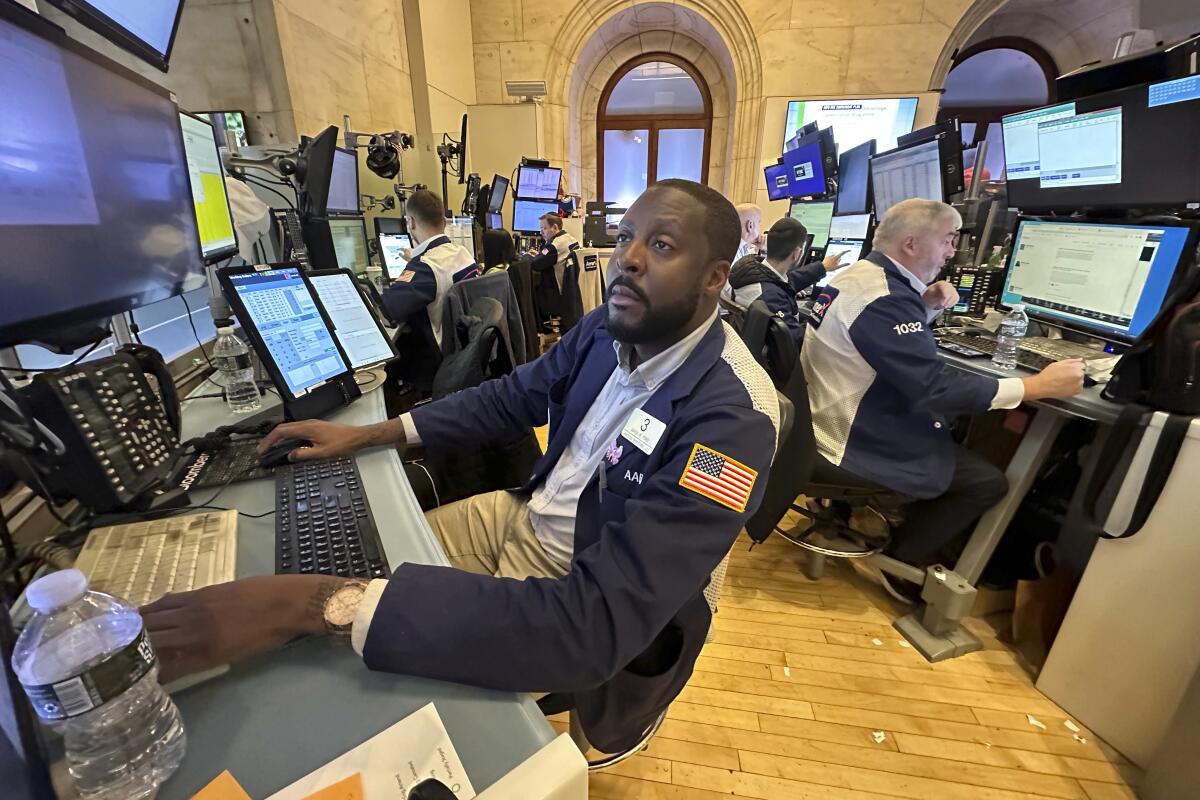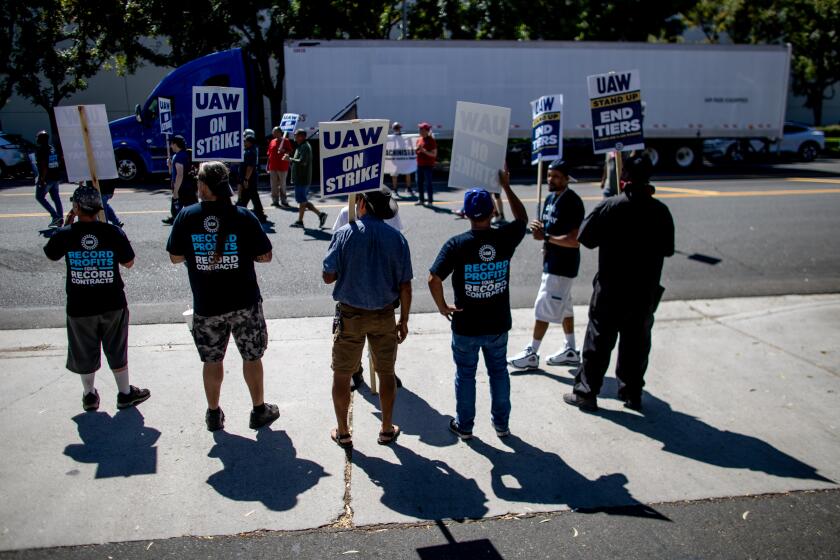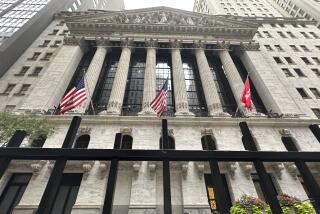Wall Street rallies and adds to its strong gains in November

Wall Street rose sharply Friday, keeping November on track to be one of its best months of the year, as companies continued to turn in better profits for the summer than expected.
The Standard & Poor’s 500 leaped 1.6% amid a widespread rally.
The Dow Jones industrial average gained 391 points, or 1.2%, and the Nasdaq composite was 2% higher.
Stocks climbed as financial markets recovered from a slump the prior day, triggered in part by worries that the Federal Reserve may increase its main interest rate further to get inflation under control. Bets diminished among traders on Friday that the Fed will increase rates at its next meeting, even though a report in the morning indicated expectations for inflation among U.S. households is on the rise.
This earnings reporting season is also turning out much better than analysts expected, and it’s likely to show the first growth in earnings per share for S&P 500 companies in a year, according to FactSet. But the focus is swinging toward what companies will do later this year and beyond as interest rates remain high and the U.S. economy is expected to slow.
“We think earnings growth can accelerate in 2024,” said David Lefkowitz, head of U.S. equities at UBS Global Wealth Management. That’s one reason he’s forecasting the S&P 500 can continue to rise modestly over the next year.
Hollywood’s twin strikes translated into a lost year of production for much of the industry with productions idle since last spring. SAG-AFTRA’s strike against major media companies stretched 118 days.
Hologic jumped 7.3% for the biggest gain in the S&P 500 after the maker of diagnostics and other products focused on women’s health reported better profit for the latest quarter than expected..
Doximity was another winner, up 16.2% after it likewise reported stronger profit than forecast.
Even some of Wall Street’s biggest losers for the day also reported better profit than expected.
Illumina tumbled 8% after the maker of DNA-sequencing and other technology products cut its financial forecasts for the full year and said “the environment remains challenging.” It reported better results for the third quarter than expected.
Wynn Resorts also topped analysts’ expectations for the latest quarter, but its stock fell 5.7% amid concerns about some weaker trends underneath the surface in Macao.
All told, the S&P 500 rose 67.89 points to 4,415.24. The Dow gained 391.16 to 34,283.10, and the Nasdaq jumped 276.66 to 13,798.11.
Big Tech stocks were the strongest forces pushing upward on the S&P 500, including a 2.3% gain for Apple and 2.5% rise for Microsoft.
They tend to be some of the biggest beneficiaries when interest rates and bond yields ease, and Treasury yields were holding relatively steady following their leap the prior day.
The yield on the 10-year Treasury dipped to 4.61% from 4.64% late Thursday.
The UAW has gotten President Biden’s support as it aims to build on its deal with Detroit’s Big Three automakers by organizing workers at Tesla and Toyota.
The yield fell even though a report in the morning suggested U.S. consumers are girding for higher inflation. Their expectations for inflation over the long run rose to the highest since 2011, according to a preliminary report from the University of Michigan.
The Federal Reserve has said it wants to keep such expectations low because they otherwise could lead to a vicious cycle that keeps inflation high. The release of the University of Michigan report initially caused Treasury yields to pare their drops, which caused stock indexes to wobble. But the stock market quickly shrugged off the data and continued to rise.
Fed Chair Jerome H. Powell earlier this month cautioned against overrating the report’s importance, when asked how key the University of Michigan reading was in the Fed’s thinking.
“We look at a range of things,” he said. “I think the UM thing got blown out of proportion a little bit, it was actually a preliminary estimate that got revised away, and I said it was preliminary in it, but that didn’t get picked up.”
By late Friday, traders were betting on only a 9.1% chance that the Fed will raise its main interest rate at its next meeting in December, according to data from CME Group. That’s down from 14.6% a day earlier.
High interest rates and yields hurt prices for stocks and other investments, while slowing the economy broadly and raising the pressure on the financial system in hopes of getting inflation under control.
A jump in yields Thursday knocked stocks lower to break an eight-day winning streak for the S&P 500, one of its longest in the last two decades. That came after the Fed’s Powell dashed some of the hopes building among traders that the Federal Reserve may finally be done raising its main interest rate.
Voters nearly universally rejected the Republican culture war Tuesday, and their distaste is an echo of shareholder votes favoring ESG issues.
The sharp moves in financial markets recently have been “all about bonds,” say Michael Hartnett and other strategists at Bank of America.
After the 10-year Treasury yield popped above 5% last month to its highest level since 2007, in part on expectations for big borrowing by the U.S. government, the S&P 500 briefly dropped more than 10% below its high point for the year. Since then, the market has rebounded as “year-end greed” set in and the 10-year yield regressed, the strategists wrote in a BofA Global Research report.
In the oil market, crude prices regained some more of their sharp losses from earlier in the week. A barrel of benchmark U.S. crude rose $1.43 to settle at $77.17. Brent crude, the international standard, added $1.42 to $81.43 per barrel. Both still lost close to 4% for the week on worries about supplies outstripping demand.
A financial services business of China’s biggest bank, ICBC, said it was hit this week by a ransomware attack that reportedly disrupted trading in the U.S. Treasury market.
New York-based Industrial and Commercial Bank of China Financial Services handles trades and other services for financial institutions. It said it had isolated affected systems and that trades had cleared by Thursday. It was unclear how much of an effect the attack had on Treasury market trading.
AP writers Zimo Zhong and Matt Ott contributed to this report.
More to Read
Inside the business of entertainment
The Wide Shot brings you news, analysis and insights on everything from streaming wars to production — and what it all means for the future.
You may occasionally receive promotional content from the Los Angeles Times.













